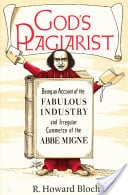God’s Plagiarist: Being the Account of the Fabulous Industry and Irregular Commerce of the Abbé Migne, by R. Howard Bloch is a wonderfully written, and documented biography of Jacques-Paul Migne.
Who is J.P. Migne, and why would Bloch spend so much considerable time researching, analyzing, and documenting nineteenth century French archives on such a name? Migne was the principal person responsible for publishing Patrologia Graeca, and Patrologia Latina — both series contains the most comprehensive texts of the Church Fathers from Clement to the fourteenth century ever available. It is likely this feat will never be repeated again.
However, the manner by which Migne so zealously went about to produce such works are full of intrigue. The approach of the book is part detective, part ethics, and respective of the political and religious background of nineteenth century France. Bloch believes it to be futile to figure out if Migne was altruistic or self-serving in motivation. He leaves that part for the reader to figure out.
The book initially appeared to be a dry biography. A deeper look brought appreciation on how deeply Bloch researched the subject. Further reading made me inquisitive and wanting to know more about the history and outcome of this important character. The richness of this book is found in the small details.
Bloch characterized Migne as a salesman, entrepreneur, industrialist, publisher, businessman, and Catholic Priest. He lived in France from 1800-1875. At the height of his company’s success, which was called Ateliers catholiques, it had over 300 employees. This was a large operation for that time.
The company not only specialized in book publishing but religious art objects as well.
In order for Migne’s vision to make the works of the Church fathers available to the general public, especially to the priesthood, he implemented five principles:
-
He kept the labour costs low. His workers were poorly paid — many of them were relatives, people networked from his hometown, and defrocked Priests.
-
He utilized the latest technologies to produce the works at the optimum speed. He used the new steam-driven printing presses whose output was substantially higher than the previous technologies, and so the per-unit cost was much less.
-
He wanted to print as many pre-existing texts available that were no longer under copyright — even leaving printing errors in the original unchanged. He did use those still under copyright but altered them in a small way to avoid royalty payments. Bloch believes the majority of the texts included in his works are pirated.
-
He increased sales through, pre-payment, subscription, referral incentive, and lending plans. He also bypassed the middle cost of Paris booksellers by direct selling. This brought controversy and resulted in the attempt by the Archbishop of Paris to unsuccessfully close his company.
-
Migne subcontracted priests for Church rites. France and Belgium had a severe shortage of Priests. Migne arranged Priests to visit undersupplied Churches at a fixed cost. He often paid the Priests a portion by the gifting of his books. The payment made by Migne to the priest was far less than what the Parishes were paying him. The difference went to Atelier catholique. This was outrightly banned in 1875 by the Catholic Church in Rome.
Bloch outlined Migne’s life as full of copyright litigation and other irregular business practices. There is no doubt that the five principles above would garner some controversy. This book does a good job at outlining these difficulties, even to the level of police reports.
The modern equivalent of Migne would be Sean Parker who started the Napster file-sharing service — a company which was shut-down due to multiple copyright infringements. Parker was also the first president of Facebook.
Migne’s search for documents uncovered a more serious problem — the housing and care of ancient manuscripts. An associate of J.P. Migne, Dom Pitra, found a cache of parchments stockpiled for the “artillery arsenal of Metz. Ordinary paper not being sufficiently tough for the packing of cartridges.” [Page 58] The authorities were notified and this policy was changed. It demonstrates that illiteracy among the general populace and the military was still very high in the 1800s. The consequence was that many historical documents have been lost due to war preparations.
There is a problem of ethics here. Migne clearly pirated texts to complete his task. As Christians, are we to use such a device that was illegally produced? On the other hand, why were other people hoarding ancient documents for selfish or pecuniary gain? These documents should be open-source, free for public use. No one should have to pay a hefty price. The copyright of so many hundreds of books would make it impossible to affordably collate them into one comprehensive series. It would kill any large-scale ecclesiastical study with the exception of a person or institution being afforded the privilege. This problem exists even today, though with initiatives such as Google Books, this is rapidly changing. Migne temporarily broke this cycle, and has enriched later generations immensely because of this.
There is more to the life and times of Jacques-Paul Migne. The ending is just as interesting as the beginning. I don’t want to play the part of spoiler here. Get the book. It should be mandatory reading for anyone wanting to read or translate the Church Fathers.
God’s Plagiarist: Being an Account of the Fabulous Industry and Irregular Commerce of the Abbe Migne, by R. Howard Bloch can be purchased at Amazon.
